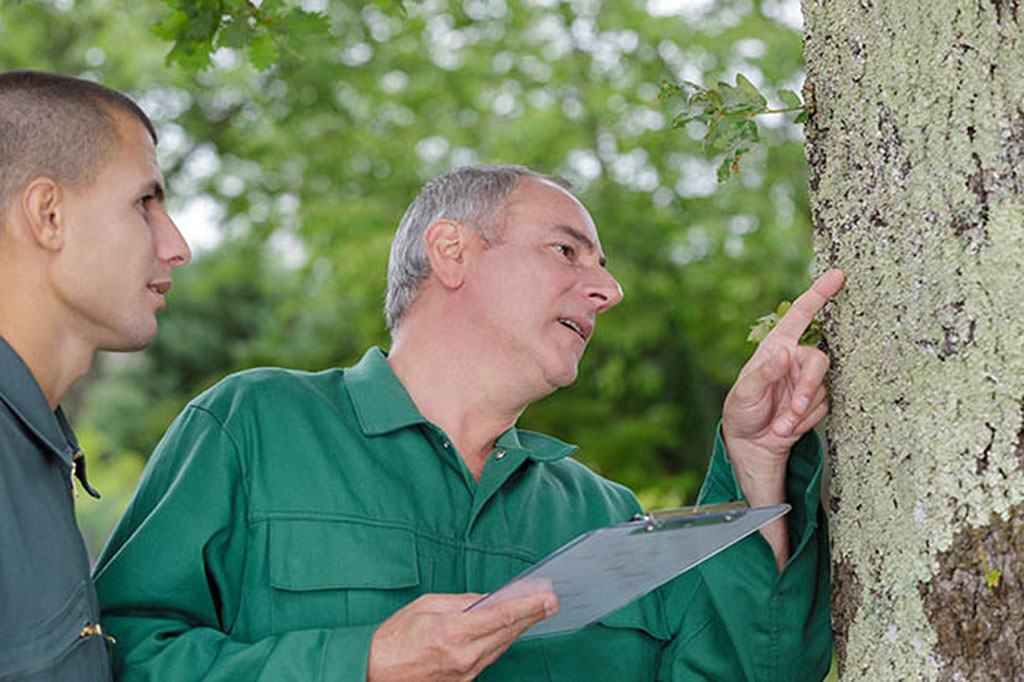How to Tell If Your Trees Need Help
Last updated November 2025

You don’t have to be an expert to spot many potential tree problems. Like most plants, trees have ways of indicating distress. Examine your trees several times a year for:
- Discolored leaves and thinning in the tree crown.
- Roots pulled loose from the ground or fungus on roots and main trunk.
- Dead branches, especially ones more than two inches in diameter.
- Deep vertical cracks on opposite sides of the main trunk.
- Sawdust on the trunk from wood-boring insects.
- A trunk that noticeably leans in one direction and a branch canopy that looks unbalanced.
- Other unusual deformities and deposits on leaves, limbs, or bark.
Other reasons for tree work include eliminating risks to your house—or to electrical or other utility wires—from rubbing or precarious overhanging limbs; letting light and breezes more readily reach your house, garden, or lawn; and protecting foundations and drainage systems from invading roots.
The problem and the solution are often obvious—say, removing specific limbs or spraying for a known pest. But sometimes you need expert advice.
One source is a tree care service, which will send a representative to your home to offer recommendations and a treatment proposal. But don’t assume that all pros can determine what’s wrong and prescribe the right solution.
Many trees are lost because they don’t receive the right care—often because they are inaccurately diagnosed, or because self-styled experts offer bad advice. Tree care companies sometimes create problems by wiping out pests’ natural predators or spraying unnecessarily for problems that would have cured themselves.
The best strategy is to invite several companies to offer estimates, asking each to explain what they plan to do and why. You can also get advice from the sources listed below.
Alternatively, find members of the American Society of Consulting Arborists (ASCA). To join, an arborist must have at least five years’ experience in arboriculture and a four-year degree in arboriculture (or closely related field) or a corresponding number of continuing education credits. ASCA members must also receive 30 continuing education units every two years to maintain their membership status. To reach ASCA’s “premier” membership level of Registered Consulting Arborist, an ASCA member must complete the Consulting Academy program, two reports, and 420 continuing education units.
The International Society of Arboriculture (ISA, isa-arbor.com) has similar certification requirements: at least three years of experience in arboriculture (or a combination of experience and education) and a passing grade on an exam. Certification is valid for three years; a certified arborist must then accumulate 30 continuing education credits every three years to maintain certification or retake the exam every three years to recertify.
Your county’s cooperative extension office has master gardeners who can diagnose plant problems—you can even bring them specimens. Other local sources of gardening expertise:
University of Delaware College of Agriculture & Natural Resources
Cooperative Extension
531 South College Avenue
Newark, DE 19716
302-831-2501
Rutgers Cooperative Extension
88 Lipman Drive
New Brunswick, NJ 08901
848-932-3600
Penn State Extension
323 Agricultural Admin. Bldg.
University Park, PA 16802
877-345-0691
Bartram’s Garden
5400 Lindbergh Boulevard
Philadelphia, PA 19143
215-729-5281
Chanticleer
786 Church Road
Wayne, PA 19087
610-687-4163
Morris Arboretum & Gardens
100 E. Northwestern Avenue
Philadelphia, PA 19118
215-247-5777
Pennsylvania Horticultural Society (PHS)
100 N. 20th Street, Suite 405
Philadelphia, PA 19103
215-988-8800
Scott Arboretum & Gardens
500 College Avenue
Swarthmore, PA 19081
610-328-8025
Tyler Arboretum
515 Painter Road
Media, PA 19063
610-566-9134


